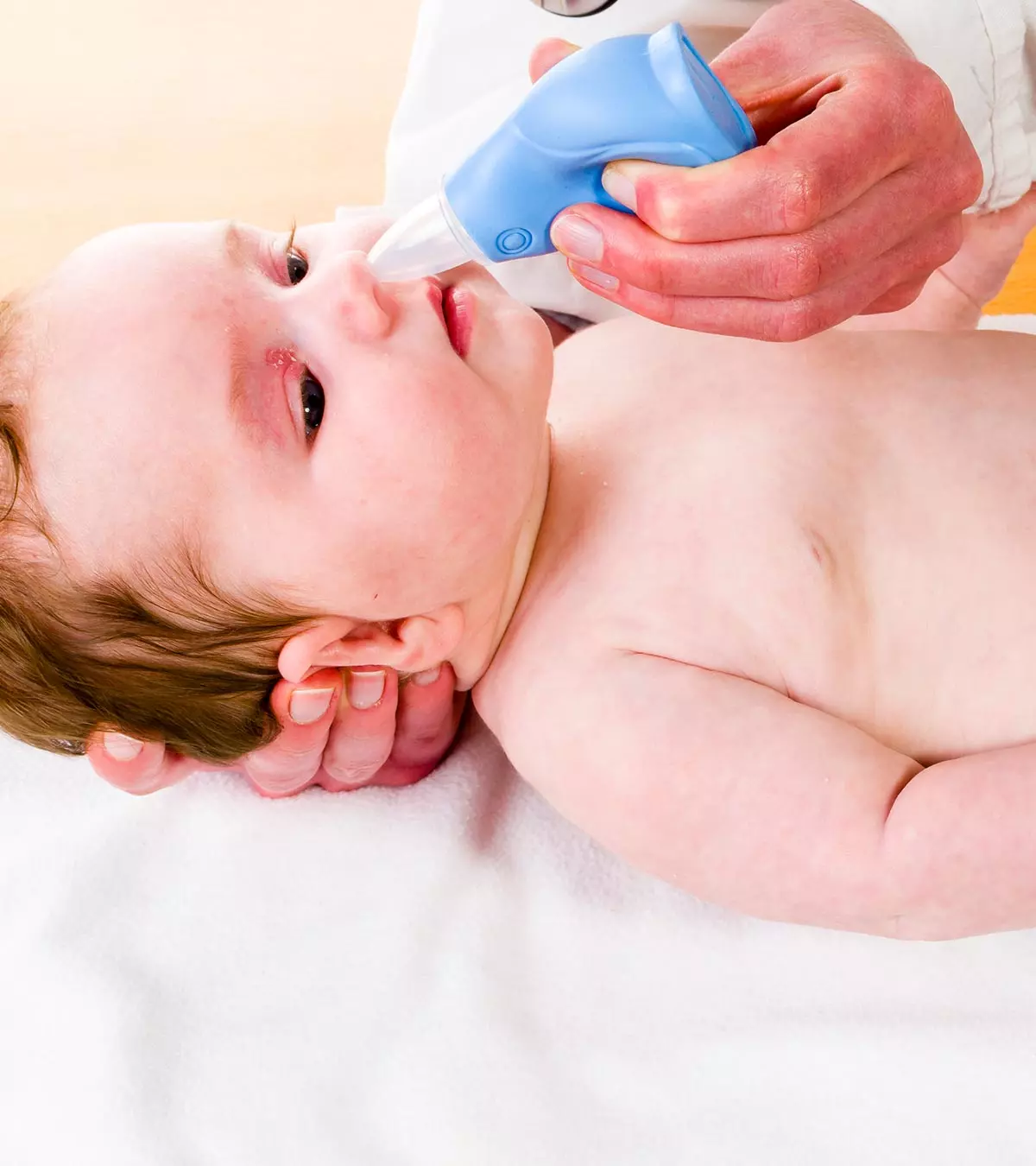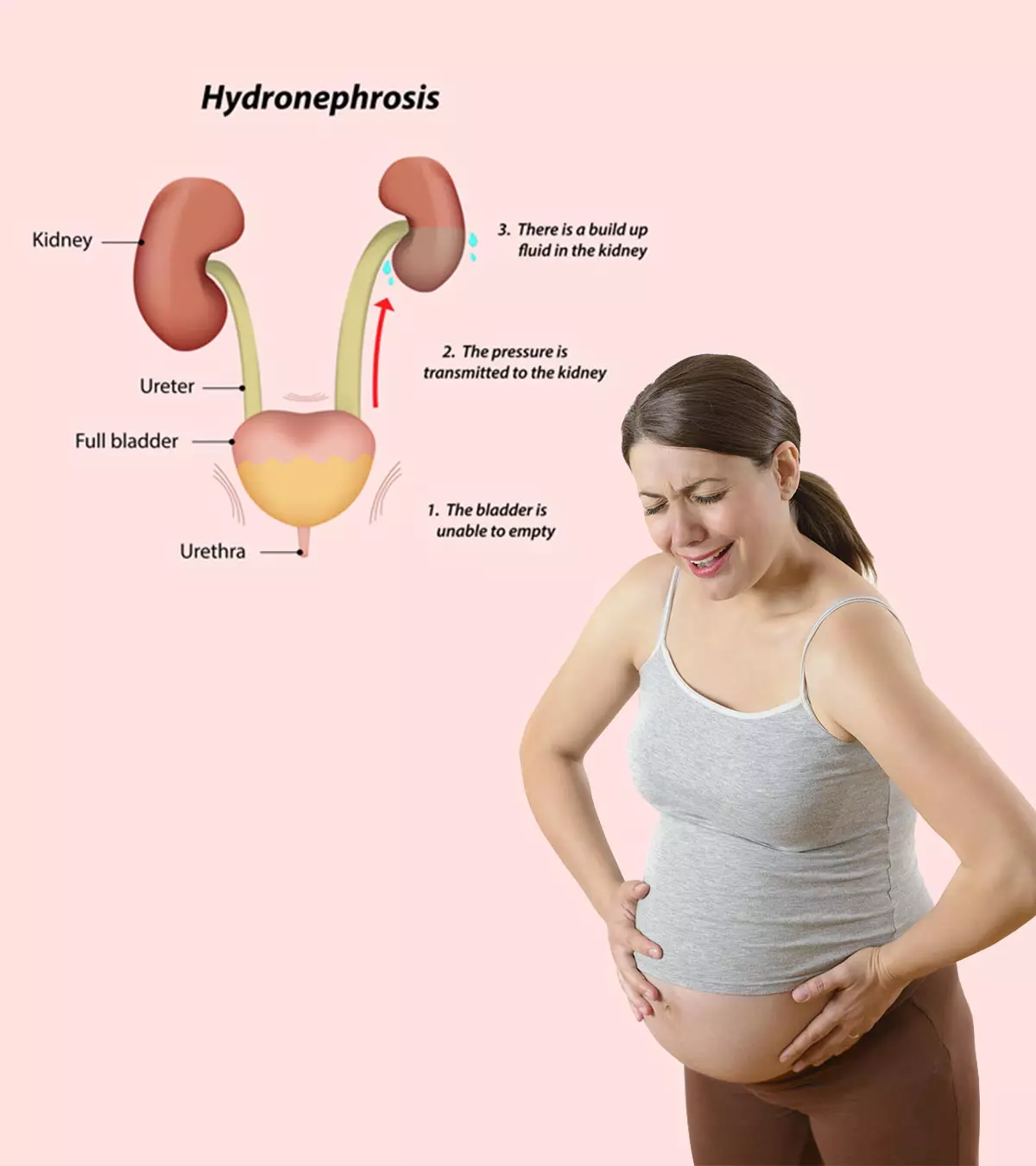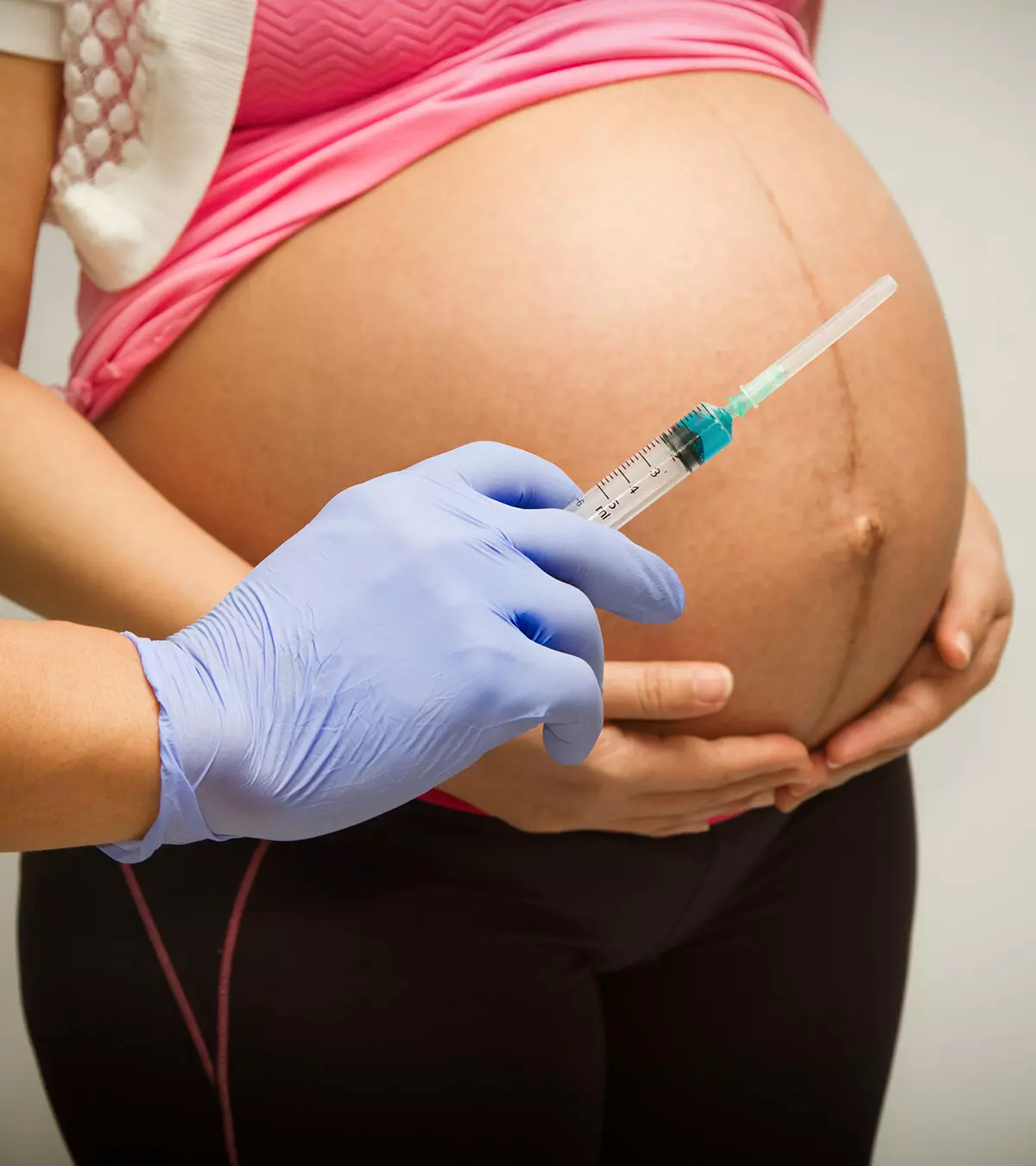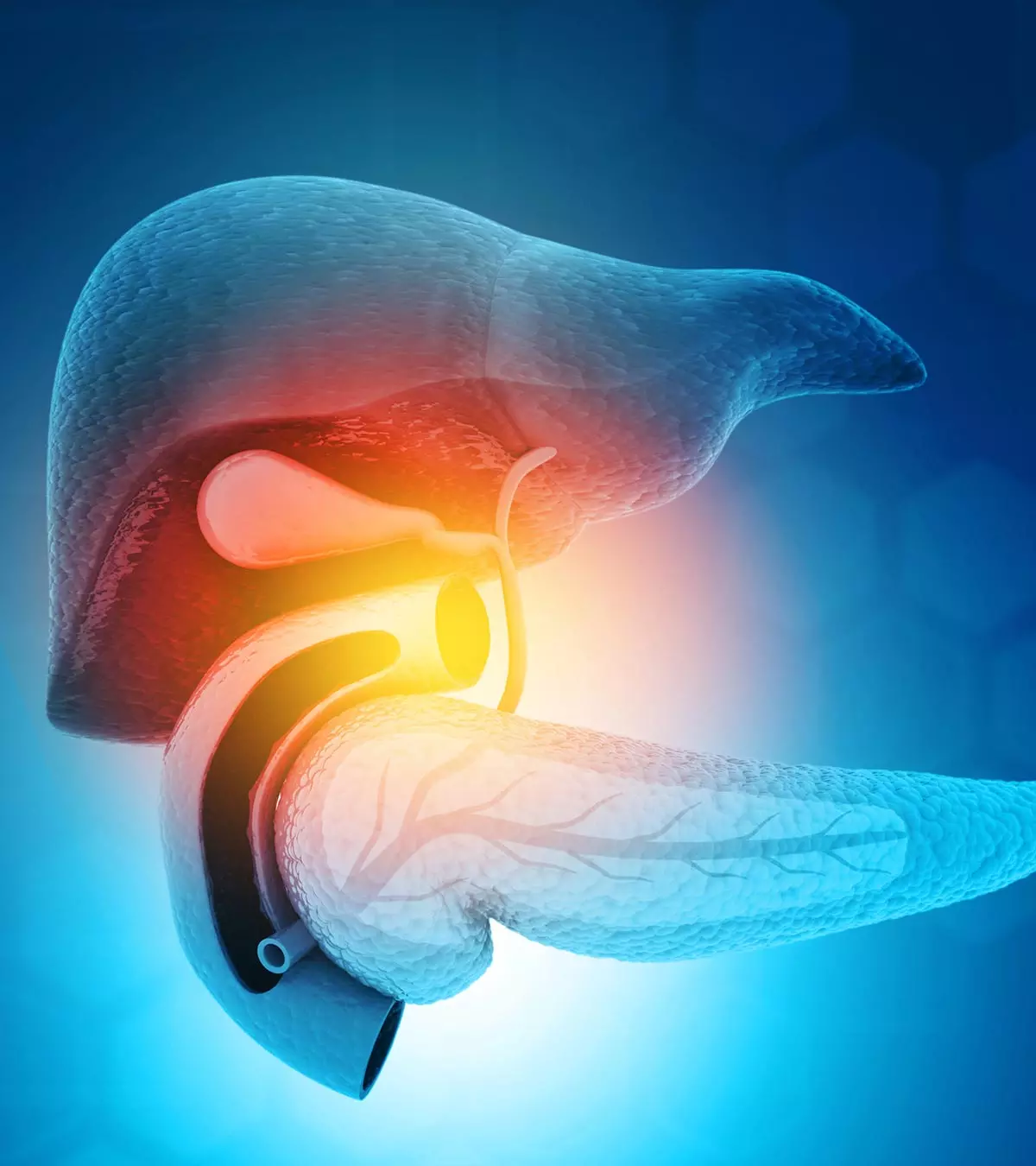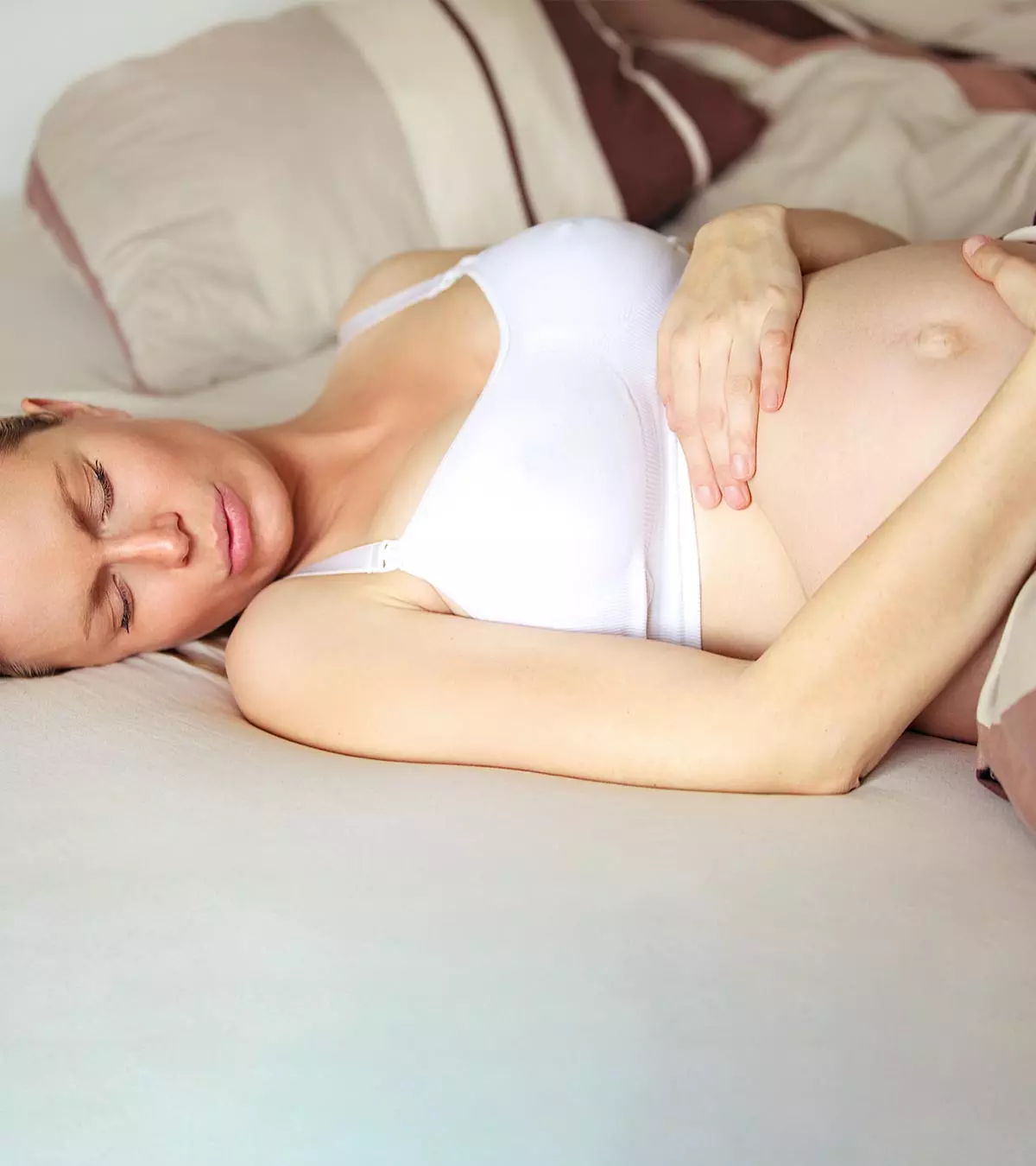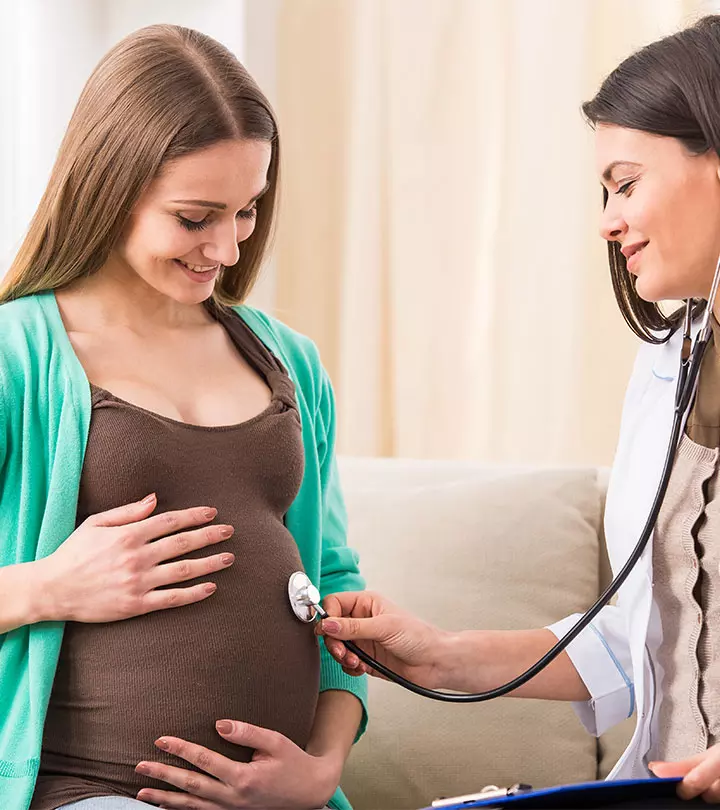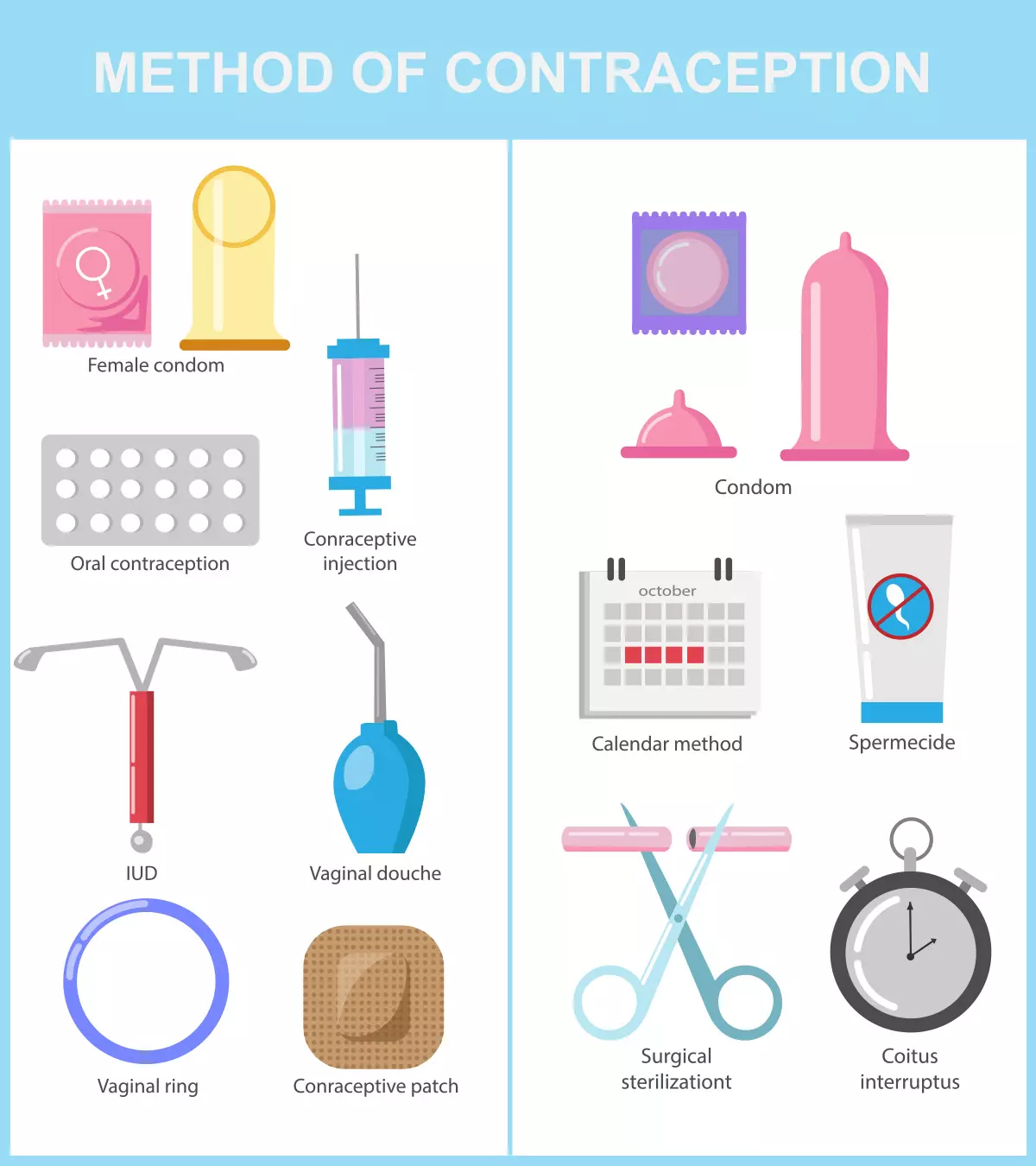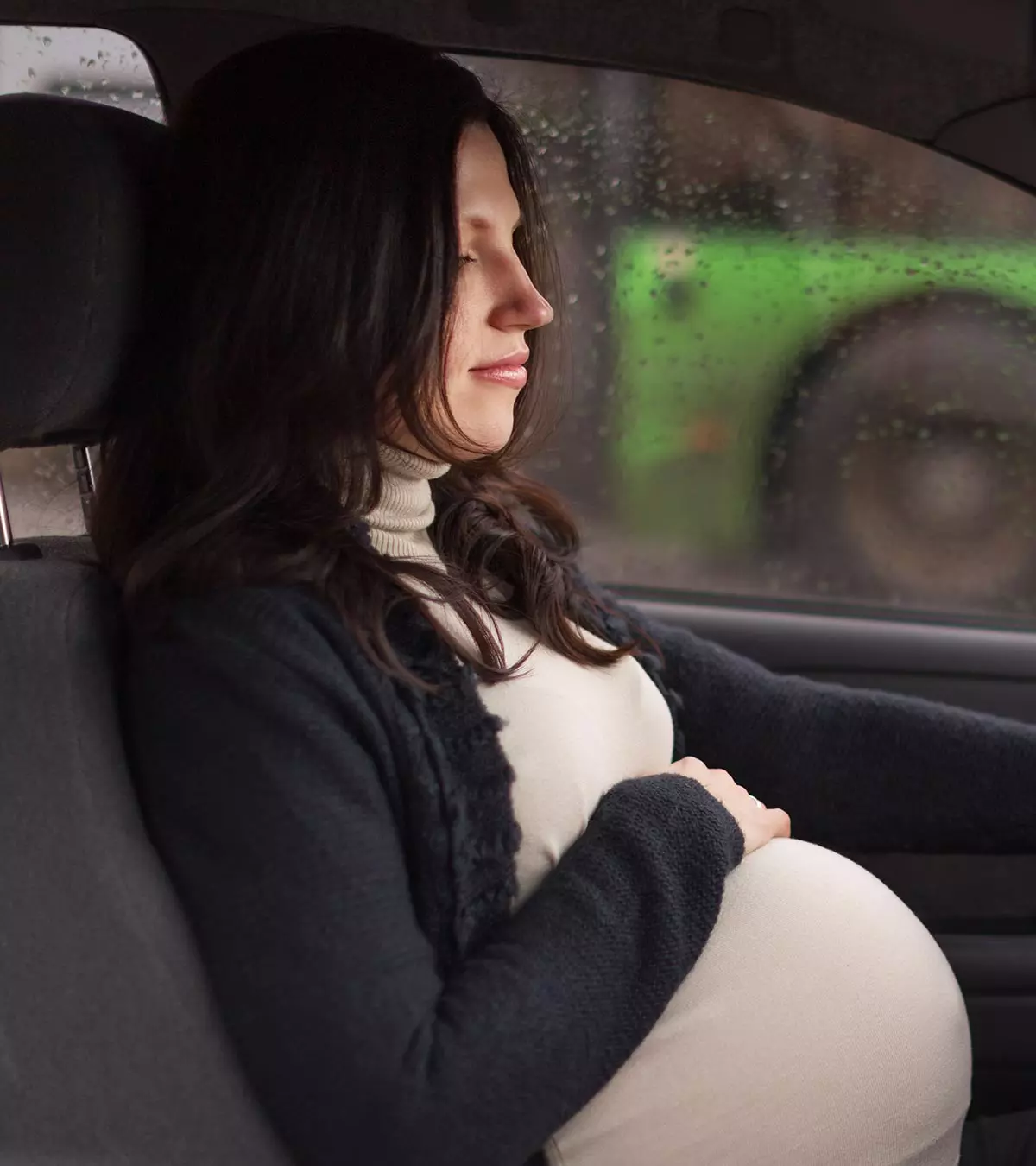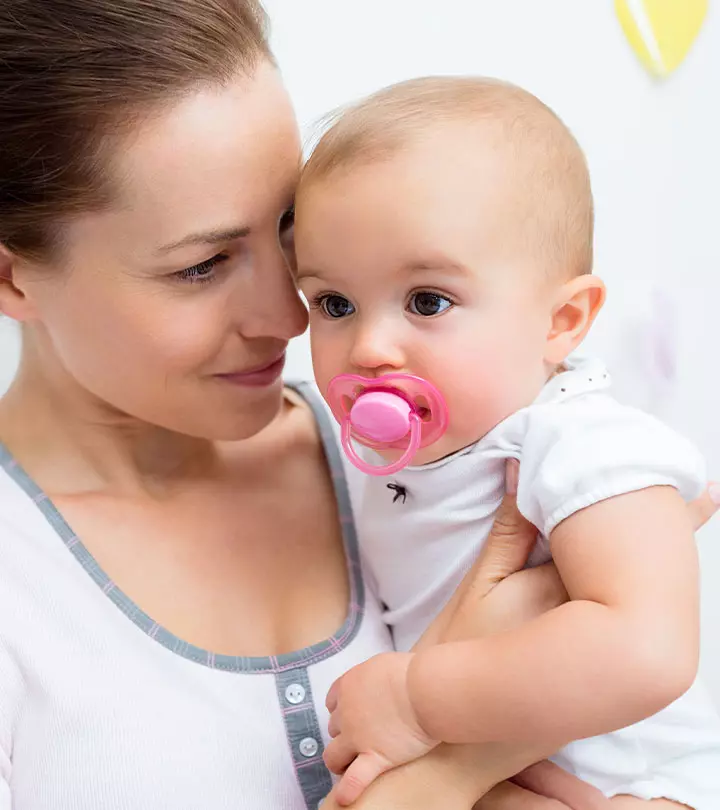
Image: ShutterStock
Digestion problems or acid refluxes can lead to chest pain during pregnancy. Although mild and short-term pains in the chest may be common in pregnant women, they can also result from serious underlying conditions. Hence, if the pain lasts for prolonged durations and starts to affect your health, consult a doctor.
In this post, we will help you understand chest pains while pregnant, including their causes and ways to cope with them.

Key Pointers
- Chest discomfort during pregnancy is common and has many causes.
- Chest pain during pregnancy can be due to various reasons, including indigestion, infection, and heart diseases.
- As the uterus grows in later stages of pregnancy, it can put pressure on the diaphragm, leading to chest discomfort and breathing problems.
- After 27 weeks of pregnancy, indigestion-related chest discomfort is more likely.
- If chest discomfort persists or makes breathing difficult, it’s best to consult a doctor.
Is Chest Pain Normal During Pregnancy?
A feeling of fullness or discomfort in your chest is not abnormal during pregnancy (1). However, you may have to see a doctor if there is numbness down your arm or persistent pain, causing shortness of breath.
Causes Of Chest Pain During Pregnancy
Chest pain may be a result of a few regular problems that pregnant women face. It could also be due to something more severe. The likely causes of chest pain while pregnant are:
1. Indigestion and heartburn

Indigestion, acid reflux, or eating fatty food can trigger heartburn during pregnancy, causing pain or a burning sensation in the chest. These could be because of the increasing hormonal changes and the growing fetus that presses against your belly (2).
 Quick fact
Quick fact2. Infection
Chest infection is one of the principal causes of chest pain. It is essentially the disease of the airways which could result in chesty coughs, wheezing, and aching chest muscles (3).
The causes mentioned above result in mild pain and may not be a cause for panic. But chest pain during pregnancy could also be due to a few serious causes, which we list down next.
3. Deep vein thrombosis
Deep vein thrombosis (DVT) is a medical condition that refers to a blood clot in a deeper vein, usually in the leg or pelvis. The blood clot in the leg can travel up your body and reach the lungs, and may, therefore, cause chest pain, pulmonary embolismiA condition in which blood vessels in the lungs are blocked by blood clots, thereby obstructing blood circulation , or in some cases that go undiagnosed and untreated, death (4).
4. Coronary heart disease (CHD)
In this condition, plaque builds up in the walls of the arteries, causing them to get narrower over time. This may restrict the flow of blood, leading to chest pain (angina pectoris) or heart attack (myocardial infarction) (5). Studies have found that pregnant women over the age of 40 are at an increased risk for chest pains from myocardial infarction (11).
5. Asthma

According to the National Institutes of Health, bronchial asthma (BA). is one of the most chronic ailments in pregnancy and may affect about 4% to 8% of all pregnancies If you are having mild asthma or have experienced it in the past, it could recur or worsen during pregnancy (6). The increase in consumption of oxygen by 20% during pregnancy and the pressure from the increasing uterine size might cause pressure on the diaphragm, leading to symptoms such as hyperventilation, wheezing, chest tightness, and chest pain (6).
6. Peripartum cardiomyopathy
This is a cardiac condition where the heart muscle becomes weak, enlarged, and diseased (7). Although rare, this condition might develop during the five months after delivery or a month before delivery. It may bring up symptoms such as chest discomfort, heart palpitations, malaiseiA state of feeling unwell or extremely weak with no definitive cause , and fatigue (8). In severe cases, this condition may cause cardiac arrhythmiasiA condition in which the heart may either beat too slowly, too fast, or irregularly , congestive heart failureiA condition where the heart cannot maintain adequate blood supply. , or blood clots which can present with initial symptoms of chest pain and faintness (14).
7. Aortic dissection
It is a rare yet life-threatening condition characterized by a tear in the wall of the aorta, the largest artery. This causes blood to leak and accumulate in between the layers of the aorta, eventually leading to aortic rupture that is presented with a sudden onset of severe and tearing chest pain (9) According to a study by the American Heart Association, there is an increased risk of aortic dissection or rupture in approximately every 4 per million pregnancies (15).
 Did you know?
Did you know?How Prevalent Are Cardiovascular Diseases During Pregnancy?
Cardiovascular diseases may be prevalent in about 1-30% of all pregnancies. The physiological changes during pregnancy may lead to cardiometabolic conditionsiA cluster of diseases caused by interrelated risk factors associated with metabolic and cardiovascular disorders . The graph below shows the cases of heart failure peaking in the postpartum weeks of 1-4. During pregnancy, they are the highest during the 19-22 weeks. 19-22 weeks is also the period when preeclampsiaiA pregnancy-related disorder characterized by high blood pressure, protein in the urine, and fluid retention and gestational hypertensioniA pregnancy-induced condition where a woman develops elevated blood pressure are likely to set in.

Cardiovascular diseases over various weeks of pregnancy
Source: Ramlakhan, K.P., Johnson, M.R. & Roos-Hesselink, J.W. Pregnancy and cardiovascular disease. Nat Rev Cardiol 17, 718–731 (2020).How To Get Relief From Chest Pain During Pregnancy?
If your chest pain becomes severe or is accompanied by shortness of breath, numbness, fainting or dizziness, palpitations, fatigue, or weakness, see a doctor as soon as possible (16).
Interventional cardiologist Laura Young suggests, “If you have a known history of heart disease and are having symptoms that you are concerned may be a heart attack, the most crucial step is to call emergency services so they can respond in a timely manner. Taking a full dose of aspirin (325 milligrams) while waiting may help reduce the risk of heart damage as well (17).”However, if the pain is benign, you may try the below measures. Note that these do not help in treating the root cause and only ease the chest discomfort temporarily (11) (18) (19) (20).
- Watch your posture: Make sure you are giving your lungs enough space. Don’t slouch while eating to keep pressure off your stomach and prevent heartburn. Sit and stand straight to allow enough oxygen to enter your lungs.

- Take it easy: Don’t overtire yourself. Rest as much as you can.
- Use a cushion: Prop yourself up a little with a pillow while lying down on your bed to keep your stomach’s contents from coming up your esophagus. It could help you breathe easily.
 Quick tip
Quick tip- Don’t sleep soon after a meal: No matter how tired you are, try not to lie down immediately after a meal. Ensure that you have a minimum interval of two to three hours this may aid in digestion, preventing heartburn and chest pain.
- Eat small portions: During pregnancy, it makes sense to eat smaller meals at regular intervals to prevent chest pain induced by acidity, heartburn, gastroesophageal reflux disease GERDiA chronic digestive disease when stomach acid repeatedly moves back to the food pipe, leading to heartburn , etc. This can also help control weight gain and obesity, preventing deep vein thrombosis, asthma, peripartum cardiomyopathy, and coronary heart disease.
- Prenatal supplements are vital: Don’t forget to take your prenatal vitamins regularly. These may help boost your immunity and aid in fetal development.
- Say no to stress: When you are pregnant, the stress levels can skyrocket and cause palpitations and other heart problems (25). So, bust stress and anxiety through meditation and yoga, or other ways that help you.
- Avoid things that cause bloating: Stay away from alcohol, caffeine, oily and spicy foods, all of which can cause gas and indigestion leading to chest pain.

- Eat healthily: Eat healthy and balanced meals, which give you enough vitamins and minerals to improve your immunity.
- Exercise: Regular exercise might keep you healthy and guard against infectious attacks and improve cardiovascular strength.
- Consult your doctor: A doctor may be able to assess your symptoms for specific conditions such as asthma, CHD, acid reflux, DVT, infections, and musculoskeletal pain and prescribe inhalers, aspirin, antacids, blood thinners, antibiotics or antihistamines, and anti-inflammatory drugs respectively (17).
Do Home Remedies Help Relieve Chest Pain?
There exist certain age-old remedies for easing chest pain induced by indigestion or heartburn and infections. While these may be harmless, there is little or no scientific evidence to support their effectiveness. Therefore, you may try the following home remedies for benign chest pains after talking to your doctor (20).
- Milk or yogurt: A glass of warm milk with honey may be able to neutralize stomach acids that contribute to heartburn. The probiotics in plain (unsweetened and unflavored) yogurt may also have a similar effect and help in soothing the stomach.
- Almonds: A handful of almonds might help in digestion by ensuring nutrition and satiation. It may also help in reducing the risk of cardiovascular diseases and oxidative stress (21).
- Coconut water: A cup of tender coconut water is an effective acid neutralizer and can also replenish electrolytes in the body. Ayurvedically, the cytokines in coconut water have also been shown to regulate blood pressure and reduce the risk of blood clots (22).
- Ginger: Ginger is proven to have anti-inflammatory, antiviral, and antibacterial properties that boost immune functions, regulate blood pressure, and prevent nausea and indigestion. Gingerol in ginger is also known to relieve symptoms of pain (23) (24).
- Caraway seeds: Add two teaspoons of caraway seeds to some boiling water and allow it to steep for 10 minutes. Drink the strained liquid; you may use sweeteners if you like.
Please note that medical consultation may be required if the symptoms persist or worsen despite trying home remedies. If you are planning to take medications for pain relief, seek medical consultation for pregnancy-safe prescriptions that can effectively relieve your symptoms.
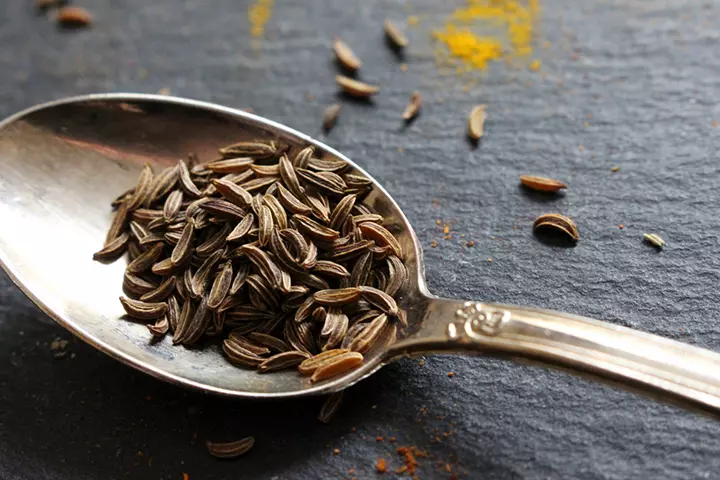
Please note that no studies support these claims, and these are mostly popular beliefs. If you are considering any of these remedies or planning to take medication for pain, seek medical advice to learn pregnancy-safe options that can effectively relieve your symptoms.
Frequently Asked Questions
1. What foods should I avoid for chest pain on the right side?
If you have chest pain on the right side, avoiding foods that can lead to gas, such as dairy products, beans, broccoli, cauliflower, foods with artificial sweeteners, and fried foods, may help relieve the pain.
2. What does preeclampsia chest pain feel like?
If you have preeclampsia, you may experience rib pain, towards the right of the upper abdomen, or at the back of the breast bone. The pain may also feel like heartburn.
3. Is chest pain normal at the end of pregnancy?
You may experience chest or breast pain towards the third trimester or the last three months due to enlargement of the breast or expanding rib cage. These changes are considered normal towards the later stage of pregnancy (9).
4. Can I get chest pains in early pregnancy?
Chest pains in early pregnancy often result from common causes such as acid reflux, morning sickness, heart ailments, pre-existing lung conditions such as respiratory infections, asthma, bronchitis, indigestion, and pleurisy, and growing breast size (11) (12). However, under rare circumstances of ectopic pregnancy, unexplained sharp pain in the chest combined with abdominal cramps may indicate a rupture (13).
5. Can labor cause chest pains?
Dr. Michael Green, a board-certified obstetrician-gynecologist from Lake Arrowhead, California, says,“ During labor, it is possible to experience chest pain, but it’s essential to differentiate between normal labor sensations and signs of a medical emergency. While chest pains can sometimes be associated with intense contractions and pressure on the chest during labor, it’s important not to dismiss any chest pain in case it is a more serious issue.”
Chest pain during pregnancy is generally caused by gastrointestinal reasons, including heartburn, indigestion, chest infections, and serious cardiac conditions such as coronary heart disease and DVT. If you have severe, prolonged chest pain accompanied by breathing difficulties and fatigue, you must seek immediate medical care. If your pain is acute, you may try certain tips such as eating in smaller portions, maintaining proper posture, practicing healthy eating, and exercising to ease the chest discomfort. Note that minor chest pain is not a reason for worry, but take your doctor’s opinion before trying any treatment measures for chest pain.
Infographic: Tips To Get Relief From Chest Pain During Pregnancy
Occasional and self-resolving chest pain could be harmless while pregnant. So, if you experience mild chest discomfort or pain, try these simple measures to ease the pain. However, if the pain persists or is accompanied by other symptoms, contact your doctor promptly.
Some thing wrong with infographic shortcode. please verify shortcode syntax
Illustration: Causes Of Chest Pain During Pregnancy And Home Remedies

Image: Dalle E/MomJunction Design Team
Are you feeling an uncomfortable sensation in your chest and wondering if it is benign or serious? Learn more about what chest pain could mean in this informative video.
References
1. Chest Pain During Pregnancy: When to Worry; University of Pittsburgh Medical Center
2. Indigestion and heartburn in pregnancy; NHS (2017)
3. Chest Infection; NHS (2017)
4. Understanding Your Risk for Blood Clots with Pregnancy; CDC
5. Coronary heart disease and pregnancy; NHS (2018)
6. Eman Shebl and Rebanta K. Chakraborty;Asthma in Pregnancy(2025)
7. Anirban Bhattacharyya et al.; Peripartum Cardiomyopathy A Review; Tex Heart Inst J (2012)
8. Lisa Kinney-Ham et al.; Acute Aortic Dissection in Third Trimester Pregnancy without Risk Factors; West J Emerg Med (2011)
9. Aortic dissection; National Library of Medicine
10. Karishma P. Ramlakhan, et al.; Pregnancy and cardiovascular disease; Nature Reviews Cardiology (2025)
15. Hooman Kamel et al.; Pregnancy and the Risk of Aortic Dissection or Rupture: A Cohort-Crossover Analysis; Journal of the American Heart Association (2016)
16. Cardiac Signs and Symptoms During Pregnancy; Northwestern Medicine
17. How To Get Rid of Chest Pain at Home; Cleveland Clinic
18. Carson & Rosene-Montella;Common Cardiac Complaints in Pregnancy; Women’s Health in Primary Care
19. Pregnant women should be aware of heart disease symptoms; Tommys
20. Pregnancy Heartburn? 7 Ways to Get Relief; Intermountain Health
21. Mary Lesser et al.; The Type of Dietary Fat in an Isocaloric Breakfast Meal Does Not Modify Postprandial Metabolism in Overweight/Obese Pregnant Women; San Jose State University (2019)
22. Shamal N.Tuyekar et al.; An Overview on Coconut Water: As A Multipurpose Nutrition; International Journal of Pharmaceutical Sciences Review and Research
23. Aspirin for preeclampsia prevention: a reply; American Journal of Obstetrics & Gynecology
24. 6 Ginger Shot Benefits; Cleveland Clinic
25. How Pregnancy Affects the Heart: Normal Symptoms & When to Call Your Doctor; The University of New Mexico
Community Experiences
Join the conversation and become a part of our nurturing community! Share your stories, experiences, and insights to connect with fellow parents.
Read full bio of Dr. Monica Agarwal
- Dr. Michael Green is a board-certified OB/GYN living in Lake Arrowhead, CA. He studied medicine at St. Louis University of Medicine and completed a Family Medicine Residency at the Ventura County Medical Center. Dr. Green did a second residency in Obstetrics and Gynecology at The Carolinas Medical Center in Charlotte, NC. In addition, he holds a masters degree in Chemistry from the California State University Northridge. With over 17 years experience, Dr. Green currently works as a site director for OBHG at Northridge Medical Center in Northridge, CA.
 Dr. Michael Green is a board-certified OB/GYN living in Lake Arrowhead, CA. He studied medicine at St. Louis University of Medicine and completed a Family Medicine Residency at the Ventura County Medical Center. Dr. Green did a second residency in Obstetrics and Gynecology at The Carolinas Medical Center in Charlotte, NC. In addition, he holds a masters degree in Chemistry from the California State University Northridge. With over 17 years experience, Dr. Green currently works as a site director for OBHG at Northridge Medical Center in Northridge, CA.
Dr. Michael Green is a board-certified OB/GYN living in Lake Arrowhead, CA. He studied medicine at St. Louis University of Medicine and completed a Family Medicine Residency at the Ventura County Medical Center. Dr. Green did a second residency in Obstetrics and Gynecology at The Carolinas Medical Center in Charlotte, NC. In addition, he holds a masters degree in Chemistry from the California State University Northridge. With over 17 years experience, Dr. Green currently works as a site director for OBHG at Northridge Medical Center in Northridge, CA.
Read full bio of Rebecca Malachi
Read full bio of Swati Patwal
Read full bio of Aneesha Amonz






